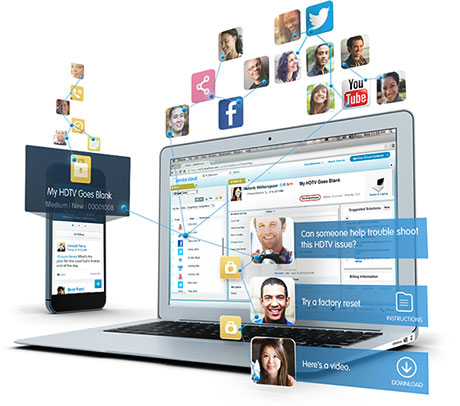Customer Service in 2039

In 1989, enterprises weren't concerned with the issues that keep today's Internet professionals up at night - online personalization, cross-channel support, Web security and the list goes on.
Twenty-five years from now, those problems that influence a user's experience will grow more complex - challenging even the savviest customer-focused brands. In this exclusive Q&A, Diane Berry, chief knowledge evangelist at Coveo, offers her opinion on what customer service will look like 25 years from now, based on the way in which advanced search technology is revolutionizing customer interactions.
Berry's analysis is backed by analyst insight and includes predictions on how wearable devices, automatic voice interactions, and predictive support technology will create the future of customer service.
How will customer experience be different 25 years from now as a result of evolving customer service/CRM practices?
 Diane Berry, Coveo: In 25 years, customers will connect automatically to answers, via voice and/or action, through wearable devices that are aware of the customer's activities with various products, their related challenges, and even their state of mind based on biometric data.
Diane Berry, Coveo: In 25 years, customers will connect automatically to answers, via voice and/or action, through wearable devices that are aware of the customer's activities with various products, their related challenges, and even their state of mind based on biometric data.
The customer's actions, combined with their "persona" -which their providers will be fully aware of, in real time, will drive suggested solutions to product-related challenges they face. The customer's real-time context will be pushed to support agents via products customers are using, which may also "know" the customer's history and preferences so agents can automatically help without the customer even taking action. This moves beyond the concept of contextual awareness and into the concept of a "personal assistant" sitting on the customer's shoulder and simply whispering the next best action to take.
The richness of information available from wearable devices, activities with products, Internet and social systems, combined with constant streams of information about other customers' experiences, intents and activities, will provide the context to make the most relevant suggestions. This will be made possible by advances in data hosting and search and relevance technology, which will be embedded in every customer interaction point.

What aspects of customer experience will see the most significant changes? Do you anticipate any elements remaining the same?
Diane Berry, Coveo: Customers will become accustomed to proactive engagement from their providers. The ongoing challenge will be increasing and enhancing engagement, which will have become, well, expected. The ways in which organizations continue to push the envelope at extreme levels of customer engagement will dominate the conversation.
Compared to today, to what level will technology dominate customers' experience with a company, versus interaction with human agents?
Diane Berry, Coveo: Obviously there will be ever-increasing amounts of technology, particularly when you consider the machine-to-machine scenario, the Internet of Things. Agents will take on more and more marketing and sales-related roles, but personal interaction will continue. On a strictly support front, agent engagement will be required only around the most complex challenges. Otherwise, customers will self-serve, or their machines and devices will self-serve.
What technologies in particular will play a role in shaping the future of customer experience? (e.g. search technologies, wearable devices, automatic voice interactions, predictive support technology, etc.)
Diane Berry, Coveo: The technologies that will shape the future of customer experience will use, make sense of and connect the vast amounts of data and information available to companies. Both the challenge and the opportunity will grow along with the amounts of data. Companies will not be able to compete without leveraging data in real-time. This is what underpins the digital transformation companies are attempting to undergo today and it will continue to unlock value far into the future, whether that value fuels person-to-person, person-to-technology or technology-to-technology exchanges.

What role will these technologies play in revolutionizing customer interactions and engagement?
Diane Berry, Coveo: Search and relevance technology will continue to be a key enabler of the digital workplace. This technology is how content can be presented within the user's context today and will enable mass personalization and one-on-one customer engagement in the future. There simply is no other way to connect the huge variety and volume of data and contextualize it for people - and potentially machines. Part of this technology is the unified index, which constantly ingests data from all systems and channels and makes connections within the data. Within the index, data is enriched, metadata is extracted (without manual tagging etc.), and all security is respected. Most importantly, the relevance engine ensures that people engage with information that makes a difference to them. It eliminates the noise to focus on what is relevant. Ubiquitous access to this relevant information via any device and any system brings relevant knowledge to people in the systems where they "live."
What companies are doing it right today when it comes to creating great customer experiences? How will visionary elements of their strategy influence other companies?

Diane Berry, Coveo: Many companies are experimenting with manual methods of predictive customer engagement and are certainly heading in the right direction. However, the cutting-edge leaders are achieving significant differentiation by automatically bringing data into the context of their users, wherever and whenever they need predictive intelligence.
As an example, a number of Coveo customers are bringing contextually relevant content recommendations directly to customer support agents where they work - in this case Salesforce Service Cloud (see image), and to customers via their online portals. Among these leaders are EXFO, PDSI, KPN and Rembrandt-Rembrandt is using Coveo across its salesforce platform to automatically connect potential deals for its sales teams to follow. PDI, a leading software solutions provider, utilizes Coveo's platform to ensure customers, agents and all employees gain real-time knowledge relevant to their unique contexts, when they need and in the interface of their choice. These are just a couple of examples of companies at the leading edge of predictive intelligence and customer engagement.









